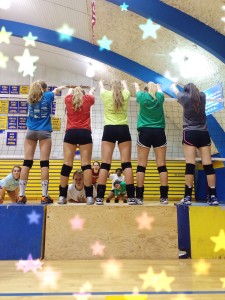I am 11 years deep into coaching (9 years as head coach) and I have used every year and every experience to grow myself and my program into one that I am super proud of. It takes a ridiculous, constant balancing act to meet the various goals of administration, parents, and the players themselves. At this point in time, I feel confident in my role and can back up my decisions with experience, statistics, and general knowledge of my sport. I understand parents’ role in advocating for their children yet feel strong enough to know when other difficult team decisions need to be made to strive towards a winning season, the goal of any competitive program.
Any coach that sticks with a high school program for any length of time knows that parent complaints can be fast, furious and sometimes, cut deep. Overall, I have been blessed with amazingly supportive parents and families which is most likely a reason I am still in the same spot I started my career. However, I do think it is interesting to point out the irony in some complaints made about me in the past:
“She talks too much about feelings” vs. “She doesn’t care if my daughter is upset.”
“She only plays her favorites” vs. “I wish she would play the same people so they can get comfortable and start winning.”
“She makes the players feel bad for mistakes” vs. “She needs to get tougher on the girls when they are playing bad.”
“Players are afraid they will get taken out for making a mistake” vs. “Why doesn’t she take girls out when they make mistakes?” (my personal favorite)
Although these don’t surprise fellow coaches, I do want to say that I think it is completely possible to achieve some sort of balance when trying to reach the goals for all “players in the game” (parents and administration included). I know from my own experience that it IS exhaustingly hard work possible to grow a successful program from the ground up by committing to:
– high standards of behavior, both in practice/games and outside of the gym
– preparing for practices with the same intensity and organization that I expect players to have during a game and in their schoolwork
– caring about the player’s personal life and emotions while teaching them how to show mental toughness when competing
– having ZERO tolerance for disrespectful behavior, especially when it comes to how players treat each other
– teaching players about the game, so they don’t have to rely on just me for feedback during competition
– finding ways to have FUN during practices and games (even when we struggle) and then be able to transition back to business/game mode
– growing and learning as a coach alongside my players (creating/experimenting with new drills, attending clinics, etc.)
In the last couple of seasons, I have found myself getting increasingly emotional about my current teams and their successes/struggles on and off the court. I attribute this emotion to the powerful combination of being proud of the work I have done, grateful to the parents that allow me to push their daughters outside of their comfort zones, and excited that I get to continue to do this work year after year with fierce, amazing young women that I love so much.

